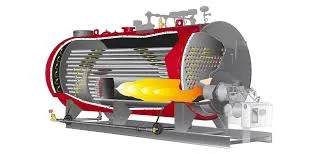
Oct . 11, 2024 16:52 Back to list
industrial steam boiler
Understanding Industrial Steam Boilers A Key Component in Manufacturing
Industrial steam boilers are essential components in a variety of manufacturing processes. These robust systems generate steam by heating water, which is then used for several applications including power generation, heating, and driving equipment. Understanding the importance and functionality of industrial steam boilers can greatly enhance operational efficiency and safety in industrial settings.
At their core, industrial steam boilers consist of a pressure vessel and a heat source. The pressure vessel is designed to contain water and steam under high pressure, while the heat source can be derived from various fuels, including natural gas, oil, coal, or biomass. The choice of fuel often depends on availability, cost, and environmental considerations. The boiler’s efficiency and emissions output are crucial factors that manufacturers must consider when selecting the appropriate steam boiler for their operations.
One of the primary functions of steam boilers in industry is to provide thermal energy for process heating. Many manufacturing processes require specific temperatures for optimal functioning, and steam provides a reliable and efficient means of heat transfer. For instance, in the food and beverage industry, steam is used for sterilization, cooking, and heating equipment, ensuring that products meet stringent health and safety standards.
industrial steam boiler

In addition to process heating, industrial steam boilers are vital for power generation. Many facilities utilize combined heat and power (CHP) systems, where steam generated from the boiler is used to drive turbines for electricity generation. This approach not only optimizes energy usage but also reduces operational costs, making it an attractive solution for many industrial applications.
Maintenance is another critical aspect of operating steam boilers. Regular inspections and preventative maintenance are essential to ensure safety, reliability, and efficiency. Boiler operators must be trained to identify potential issues such as leaks, scale buildup, and corrosion. Implementing a robust maintenance program can significantly extend the lifespan of a boiler and reduce the risk of unexpected downtime.
Furthermore, with increasing environmental regulations, the industry is witnessing a shift towards more sustainable practices. Modern steam boilers are designed to minimize emissions and enhance energy efficiency. Technologies such as condensing boilers, waste heat recovery systems, and advanced controls are being integrated to reduce the carbon footprint of industrial processes. Adopting greener technologies not only helps comply with regulations but also aligns with global sustainability goals.
In conclusion, industrial steam boilers are indispensable in various manufacturing sectors, providing essential heat and power. As industries continue to evolve, the focus on efficiency, safety, and sustainability will drive the development of more advanced steam boiler technologies. Understanding the functionality and importance of these systems will empower manufacturers to optimize their operations, reduce costs, and contribute positively to environmental conservation. As the backbone of many industrial processes, steam boilers will remain crucial to the future of manufacturing.
-
High-Efficiency Commercial Oil Fired Steam Boiler for Industry
NewsJul.30,2025
-
High-Efficiency Biomass Fired Thermal Oil Boiler Solutions
NewsJul.30,2025
-
High Efficiency Gas Fired Thermal Oil Boiler for Industrial Heating
NewsJul.29,2025
-
High-Efficiency Gas Fired Hot Water Boiler for Sale – Reliable & Affordable
NewsJul.29,2025
-
High Efficiency Biomass Fired Hot Water Boiler for Industrial and Commercial Use
NewsJul.29,2025
-
High-Efficiency Biomass Fired Hot Water Boiler for Industrial Use
NewsJul.28,2025
Related PRODUCTS






















